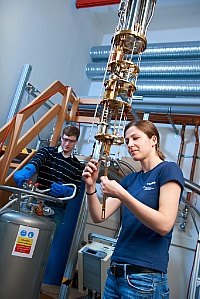Bachelor, Master and PhD theses
The HLD offers the possibility to carry out your practical courses as well as for Bachelor, Master and PhD theses for interested students of appropriate branches of study. Furthermore, we provide the opportunity to work as a student research assistant at our institute.
You may send us your application or contact us by phone or e-mail.
Bachelor projects 
-
Magnetization studies of novel magnetic materials
Novel magnetic materials will be investigated by means of modern magnetometry methods (SQUID, HALL). You will use advanced measurement techniques and devices in order to study novel magnetic compounds at extreme sample conditions. You will perform the experiments by use of computer-assisted data acquisition and analyse your data by means of modern software tools.
- Electronical and thermodynamic transport
In this project, you will perform measurements of the electronical and thermodynamical transport. These experiments will be conducted at extreme sample conditions (low temperatures, high magnetic fields, high pressures).
- Thermometry at extreme sample conditions
Precise thermometry at very low temperatures and high magnetic fields is an ambitious task. It needs to be attuned to experimental measurement techniques. There are several methods at choice, e.g. resistance, permeability, permittivity, Coulomb blockade or nuclear spin resonance thermometry. In your bachelor work, you will address one of these techniques in experiment and its underlying theoretical concept.
The student will be supported by the HLD team.
Master projects
- Quantum oscillation measurements in strongly correlated electron systems
You will utilize high magnetic fields in order to observe quantum oscillations by means of high resolution transport (Shubnikov- de Haas effect) or magnetization (de Haas-van Alphen effect) measurements. Your data will give insight into the band structure and Fermi surface of novel, not yet understood materials.
- Thermodynamics of quantum materials
Investigation of the magnetic ground state of new complex materials by means of heat-capacity measurements at very low temperatures. You will perform thermodynamic measurements by using the ultralow-temperature equipment of the HLD. Magnetic fields applied to the sample will be produced in superconducting magnets. - Nuclear magnetic resonance studies
Nuclear magnetic resonance studies of novel iron-based and organic superconductors, as well as magnetic systems with low-dimensional and frustrated interactions at extremely low temperatures and highest magnetic fields.
PhD projects
-
We are always looking for talented PhD students with very good university degree (Diploma/Master) in physics for thermodynamic and spectroscopic investigations of novel solid-state materials (for instance, frustrated magnets or superconductors) at extremely high magnetic fields (up to 95 T) and very low temperatures (down to 10 mK).
Postdoc positions
Available vacancies are listed here.


